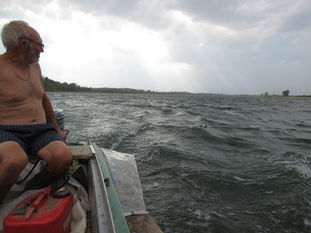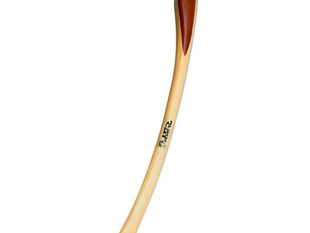
In recent years, all fishermen (my father included) have been complaining of very hot summers. That of 2024 was officially declared to have been the hottest for over a century.
The negative effect this warming up had on fishing came from the rapidly heating river. Already by the beginning of July, the temperature of the water reached 27 C. It continued to rise and in August it was already over 30 degrees.
In result, the fish sought the deeper and cooler places in the fastest current, i.e., beneath the heavy traffic lane. Placing bottom nets in the fast current was challenging. One needed a long and heavy rowing boat, strong nets, and heavy weights for anchoring. Two people were needed for the job. One sat at the oars, while the other lowered the nets. When well-placed, the nets promised some return, but there were many occasions when nets 200-300 m long came out empty.
One was grateful when they came out at all. It was not rare that the nets got caught on sodden tree-trunks, rolling on the bottom. There was nothing to do, but cut through the netting and let it go. Holding on to the nets could overturn the flat-bottomed river boat.
Another reason for poor catches were the water-weeds. With the rise of water temperature, the weeds began to grow very rapidly. They formed sheets in the water which stretched for hundreds of metres. This made net fishing – as also angling – practically impossible. Taking out a net full of weeds was not only a very heavy job, but afterwards it required laborious cleaning. The only way one could clean such a net was to stretch it out in the sun until the weeds became dry and brittle. Then the weeds in the net had to be crushed between one’s palms until the net was clean. My father’s palms had acquired the texture of sandpaper.
After cleaning a net – an operation which could last for three or more days – one had to think seriously before putting it into the water again. After taking out a net full of weeds for a second time one usually gave up. One by one the fishermen and anglers disappeared from the river. Only clonkers remained on the water beating with their spoons for catfish. Eventually they also disappeared. Fishing had to wait until the water temperature fell to about fifteen degrees, ideally ten. That would be in October-November, and further on into the winter.
All in all, the situation with fishing was such that good fishing could be done from late autumn to early spring. As said earlier on, there was good angling for Danube mackerel in May. Good fishing there was also in June. From there on some relief came only with strong winds or thunderstorms. The wind would churn up the water and tear off the sheets of weed from the bottom. The current would carry them downriver to places one did not want to think about. For a few days afterwards there would be a window for net-fishing. When the water calms down and the temperature shoots up, the weeds regain their hold on the river. Fishing becomes pointless.
All of this means that after June, fish rarely visits my father’s and the jackals’ table . The situation calls for special measures. Meanwhile, one could seek solace in the serenity of twilight.

Food in July-August
What saves the day is that both humans and jackals are flexible creatures about food (and not only). There are many edibles besides fish. And there is always the oats to rely on. A somewhat bland, but stable pillar of support.
This solid and faithful friend comes from our family’s muesli-producing workshop in Sofia – Familia Nikola Ltd. A struggling business in the difficult local conditions, it still found strength enough to generously provide whatever it could afford. As the nightly menu would be two-thirds soaked muesli or oatflakes, that amounted to an average of some five kilos per night. For an average season of roughly 100 days (May-August), the oat-based food came up to nearly half a ton. It was a product with reduced price due to expired date, but still involving not a little effort in transporting it to the camp. Without Familia Nikola and my brothers, keeping the bait-site well provided would have been a lot more difficult (and costly). Ultimately, it was a great stroke of luck that jackals liked their porridge so much.
My father had read an article about some Italian researchers who used a camera-covered bait-site, remotely monitored. Their bait for the jackals was tinned tuna fish. ‘Imagine us buying half a ton of tinned tuna fish!’, my father would exclaim. ‘Tuna fish!’ he would mutter, shaking his head. The phrase became a family by-word for the absurdly impossible.
Village produce
Dearth of fish from the river made a weekly trip to the village shops part of the routine. From early July on and the lowering of the water-level, a rough car-track formed along the bank. On a rickety quad bike, my father could now drive for food to the nearest Stanevo (3km), or the more distant Kovachitsa (6 km).

Stanevo, as mentioned before, had seen better days, now long gone. The grocery there could offer cheap sliced bread, sunflower oil and chicken sausages, but little else. The rest my father would buy from the villagers. In little garden-plots around their houses, local people grew vegetables for their own needs. When in surplus, they were glad to sell some. Thus, my father kept the camp supplied with tomatoes, peppers, cucumbers, onions, garlic. These were vegetables bringing back long-forgotten smells, textures, and tastes. They had nothing in common with the creations on supermarket shelves.

Buying vegetables from villagers was a deeply social occasion. Questions were asked about how it was by the river – in May and June it was only my father who lived there. Mostly elderly people, village friends remembered days long past. They used to play by the river as children, while their grandfathers tended the now gone vineyards by the river. Velko (from whom the tomatoes came), now in his late seventies, remembered the big grass-snake living at Km 727, a legendary creature. Could it be the same grass-snake living now at the camp? (My father called her Delongi, about her in the next story.)
Importantly, the vegetable buying mission gave a chance of asking village people about the jackals. The principal question was: ‘Has any damage been done to you by jackals? Like poultry or domestic stock taken?’
The answer to that has been negative over the years. No, nothing had been taken, although sometimes jackals came very close, by the front gate. Villagers did not like the howling. Old women complained that it scared them big time. ‘It’s eerie’, they would say, ‘like babies crying’. But there was no word said about damage.
Herbs
In early June, one could pick lintel-tree blossoms from the old lintel-trees in the village streets. My father would bring back a basket-full to the camp and dry it in the shade of the tent. That made excellent herb tea.

Home-made sheep, goat, and even water-buffalo cheese could be bought from village houses. Also honey, butter and eggs. The village women sold eggs from the chickens running around the houses, from ducks, and sometimes from geese.
The cheese, when sundried, kept well. Broken into the morning porridge of oats, and with a spoonful of honey, it made the invariable breakfast of the camp. Broken pieces of dry bread, which my father baked in the oven, broken cheese, a small piece of butter, and all of that poured over with lintel-tea, covered with another plate and left to steam – that made a full dinner.

Besides the lintel-blossoms, there were many other herbs on the flat pastures which began from the edge of the bluff, vertically rising behind the tent. This was in jackal-land from where howling choruses could be heard during the night. My father would gather zhult kantarion (St. John’s wort, Hypericum perforatum) for tea, as well as many other herbs.


By Bulgarian tradition, herbs should be gathered in June when their medicinal potency is strongest. The ideal time is the night before Eniovden (Day of the Nativity of St. John the Baptist). This festival of Eastern Orthodoxy falls on 24 June. If one is to observe the tradition strictly, one should gather herbs at midnight.
St. John’s wort had prime place in the ritual. It was known for its high medicinal potency and magical properties (like providing what far into the future would be called television). The night before Eniovden is associated with such magic, harking back to ancient Slav traditions. There would be women dancing at midnight and other visitations.

The people of Stanevo preferred to be in their beds during the magic night – what with the jackals being especially vociferous all through it. Connected or not, on the herb-fields above the camp there was a round clustering of wild flowers, which my father called The Women’s Dance:

His claim was that at midnight of Eniovden, a jackals’ chorus would be heard from exactly that place. He would gather herbs in the morning from around there. He said teas from those herbs helped him think about jackals’ mysterious ways.

Kovachitsa and the corn fields
By contrast with run-down Stanevo, Kovachitsa is a village of plenty. There is practically everything in its four grocery stores. There my father could get cheap Romanian turkey carcasses, which made excellent dinner for the jackals. There were other attractive goods like dog-salami and chicken wings. On the top of the list were frozen chicken gizzards and livers.
The greatest attraction of the longer trip to Kovachitsa were, however, the corn fields. On his way to the village, my father would first drive for a kilometer upriver along the bank, and then turn South. He drives up on a series of hills, rising one after the other. Finally, the plain opens up. On the horizon the first houses of Kovachitsa could be seen.
On both sides of the dusty dirt-road there are vast fields of corn. The corn is in its milk ripeness. The jackals were mad about it, eating the corn together with the cobs. My father boiled the cobs in their leaves. Together with goat-cheese, lintel tea, and honey from Stanevo, this made a rich filling dinner. On the side, or rather in front, it offered great food for meditation.

Vegetables from the villages were cooked into mish-mash: my favourite ratatouille-like Bulgarian summer dish. The difference is that all vegetables – tomatoes, peppers, aubergine, zucchini, onion and garlic, aren't grilled but fried in a big pan. Towards the end, when the paste thickens, broken cheese and then eggs are added. My father would pour the paste into jars when boiling hot. Thus it could keep for a couple of weeks.
The mish-mash gave a lot of vegetable peelings and the jackals would eat them all. All vegetable leftovers would be used including watermelon and honey-melon rinds. Egg-shells he crushes and adds to the oat-mush. The only leftovers the jackals ignore are lemon rinds and onion skin.
Keeping all vegetables safe is, however, the challenging part of cooking. The jackal family are ethical creatures and never stole food. But there were petty thieves out there who gave my father reasons for intense thinking. About these marauders we’ll tell you in the next story.







